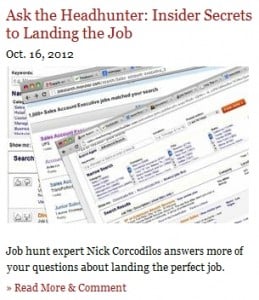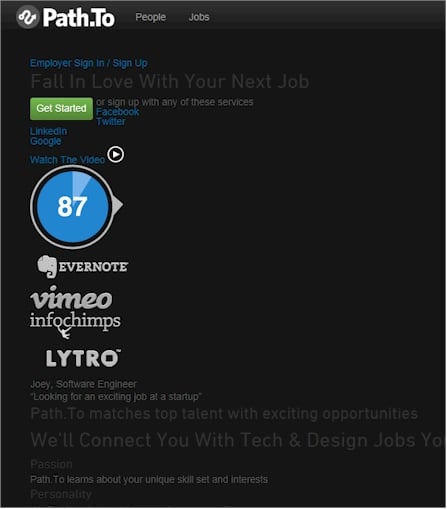In the July 10, 2012 Ask The Headhunter Newsletter, a job hunter complains that job leads don’t pan out any better than job postings:
To build up my networking, I’ve started going to two different job clubs. One is related to my line of work, information technology (IT), and the other is more general, with people from lots of professions attending. Both groups start with a job lead portion of the meeting and some good information is given out. But I wonder what you have to say about this, since you advocate networking so much. None of these leads have panned out any better than job postings I respond to. I submit my resume and I try to call, too, but nothing develops. Job leads from real people should be more productive than answering job postings, you would think. Is networking a fallacy or am I doing something wrong?
My Advice
Networking is not a fallacy, but the term is so over-used that I think it’s confusing you. Getting job leads at job clubs is not networking. What you’re doing wrong is wasting face time, and I’ll try to explain why. But first, I think you’re right that “job leads” are no better than job postings.
Most job leads are like job postings
Have I gone totally nuts? Am I telling you to say NO to a job lead?
Not all job leads are the same. While getting a lead at a meeting might seem more personal, it’s very different from a personal referral from some who knows, respects, and trusts you — and who has true insider connections. The leads you’re talking about could originate anywhere. They are more like job listings than leads.
Now I’ll try to explain why you should say no to most job leads. Matt Bud is a friend of mine who runs The FENG — The Financial Executives Networking Group. In a recent newsletter to over 40,000 members, Matt discussed one of The FENG’s services: in-person meetings where financial folks network and share job leads. Matt makes the same point I do — and I think very few people get this, so please think about it carefully:
“Sharing old job leads, which is what happens at face to face meetings, doesn’t really benefit anyone. It just takes up time that could be better spent networking.”
I do pro bono presentations for a local job club. Here’s what I say to them:
“So, here you are — a bunch of unemployed people, coming to meetings where you expect other unemployed people to give you job leads…”
Most job leads are old news
As Matt points out in his newsletter, any job lead is old news by the time it gets to you. It’s almost no better than a job posting on Monster.com. But, you might say, this is information fresh from the lips of real people who often get job leads from personal contacts.
Here’s Matt’s take on the value of such leads:
“Were they filled yet? Probably not, but the candidate slates aren’t likely to be expanded if the job is over a few weeks old. They sound good, but you are receiving totally useless information.”
Invest in opportunities, don’t chase what comes along
The age of job leads isn’t the only issue to consider before you quickly tap out a resume submission on your smartphone. That lead — even if it’s sound — is for a job that came along, not one you developed yourself. This is an important point.
While you’re likely to chase what comes along, by quickly e-mailing an application on a lead, you’re probably far more motivated to invest in a more effective approach if the job (or employer) is one you carefully researched and decided was a top-quality target for you.
For example, you might triangulate around the job to get inside information that confirms the fit and bolsters your presentation. You’re also more likely to cultivate a strong personal referral who actually recommends you to the boss. Both actions help you vet the opportunity and boost your chances of success dramatically.
But you’ll shake your head and ask, What’s the point, since any lead, no matter where it comes from, could turn into a good opportunity? My point is that opportunities that “come along” often turn into mistakes, precisely because you didn’t choose them yourself. I think most people go job hunting because they took the wrong job to begin with, most often because “it came along.”
Network with a plan
Job leads that come along are not what’s best for the job hunter. True opportunities that are really good for you are carefully selected and developed, not picked up at a meeting. Showing up and listening to a broadcast of leads is not networking, even if it’s done in person.
Most of the time, networking is a lifestyle. It’s about meeting new people and blue-sky exploring. In this context — active job hunting — networking is a tool in the service of a clear objective. “A job” is not a clear objective. A particular employer or job is. The approaches are radically different.
Carefully select a target employer or job, and network to gather information that lets you develop a plan you can present to the employer. Be ready to demonstrate why you are the profitable hire. Network to convince insiders to recommend you. The most effective form of networking involves finding people who introduce us to employers, and who teach us how we can help the employer — so we can stand out as the person the employer wants to hire.
A job lead picked up at a meeting gives you no such edge because you didn’t work for it.
Say NO to job leads — Say YES to networking
I agree with Matt Bud. Getting together with other job hunters to hear about job leads is a waste of time. Learn to say no to job leads, and instead use the time more profitably. Use face time to network — but have a very specific, clear objective.
My PDF book, How Can I Chang Careers?, includes a pivotal chapter titled “A Good Network is a Circle of Friends.” One section, “Seek advice, not help,” emphasizes the importance of having a specific objective you need advice about — whether you’re changing careers, or just jobs:
“No one wants the ‘Can you help me find a job?’ monkey on their back because the monkey requires feeding and lots of attention. That’s why most people you ask for help will quickly refer you to the personnel office. On the other hand, if you approach me for advice rather than help, that’s something I can provide…”
The person you’re networking with will be happy to share advice and engage in discussion that reveals whether you’re worthy of friendship. And friendship is what leads to personal referrals, which is where jobs really come from.
Am I splitting hairs, or is a job lead about as useless as a job posting? How do you network to get truly useful referrals? Do you give out job leads? What’s the best way to get in the door for the job you really want?
: :
 I answered many of their questions in a special column on the NewsHour website. And the questions kept coming.
I answered many of their questions in a special column on the NewsHour website. And the questions kept coming.














